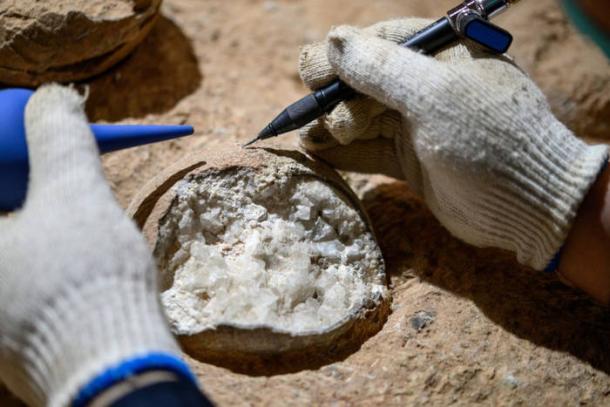Science
Scientists Date Dinosaur Eggs to 85.91 Million Years Old

Researchers in China have made significant strides in paleontology by successfully dating dinosaur eggs directly for the first time, determining that these ancient fossils are approximately 85.91 million years old. This breakthrough, conducted at the Qinglongshan site in Hubei Province, employs a novel “atomic clock” dating technique that could transform our understanding of dinosaur evolution and the climate changes during the Late Cretaceous period.
Unprecedented Insights into Dinosaur History
The dinosaur eggs in question belong to the species Placoolithus tumiaolingensis, and this research provides unprecedented insights into a critical time in Earth’s history. The analysis reveals that around this period, the planet underwent dramatic cooling, potentially influencing patterns of dinosaur extinction. This discovery marks a significant advancement in the field, as previous dating methods primarily relied on indirect techniques.
The clutch of dinosaur eggs found at the Qinglongshan site includes a total of 28 eggs, with most specimens identified as Placoolithus tumiaolingensis. The innovative atomic clock technique used in this research allows for precise dating, offering a clearer timeline for the existence of these creatures and their environmental context.
Implications for Future Research
This research not only sheds light on the age of these dinosaur eggs but also opens doors for future studies in paleontology. Understanding the environmental conditions during the Late Cretaceous period can provide valuable perspectives on the factors that contributed to the decline of dinosaurs. The implications of this research extend beyond the eggs themselves, potentially leading to further discoveries about the ecosystems that existed millions of years ago.
Bi Zhao, one of the researchers involved in this study, emphasizes the importance of these findings. “By directly dating these eggs, we can better understand the timeline of dinosaur evolution and the environmental factors that may have impacted their survival,” Zhao stated. This approach could change how scientists approach paleontological studies in the future, paving the way for more direct dating of fossils.
As the scientific community continues to explore the depths of our planet’s history, this breakthrough at the Qinglongshan site stands as a testament to the advancements in technology and methodology within the field of paleontology.
-

 Top Stories2 months ago
Top Stories2 months agoTributes Surge for 9-Year-Old Leon Briody After Cancer Battle
-

 Entertainment3 months ago
Entertainment3 months agoAimee Osbourne Joins Family for Emotional Tribute to Ozzy
-

 Politics3 months ago
Politics3 months agoDanny Healy-Rae Considers Complaint After Altercation with Garda
-

 Top Stories3 months ago
Top Stories3 months agoIreland Enjoys Summer Heat as Hurricane Erin Approaches Atlantic
-

 World4 months ago
World4 months agoHawaii Commemorates 80 Years Since Hiroshima Bombing with Ceremony
-

 Top Stories2 months ago
Top Stories2 months agoNewcastle West Woman Patricia Foley Found Safe After Urgent Search
-

 Top Stories4 months ago
Top Stories4 months agoFianna Fáil TDs Urgently Consider Maire Geoghegan-Quinn for Presidency
-

 World4 months ago
World4 months agoCouple Convicted of Murdering Two-Year-Old Grandson in Wales
-

 World4 months ago
World4 months agoGaza Aid Distribution Tragedy: 20 Killed Amid Ongoing Violence
-

 World4 months ago
World4 months agoAristocrat Constance Marten and Partner Convicted of Infant Murder
-

 Top Stories3 months ago
Top Stories3 months agoClimbing Errigal: A Must-Do Summer Adventure in Donegal
-

 Top Stories3 months ago
Top Stories3 months agoHike Donegal’s Errigal Mountain NOW for Unforgettable Summer Views









